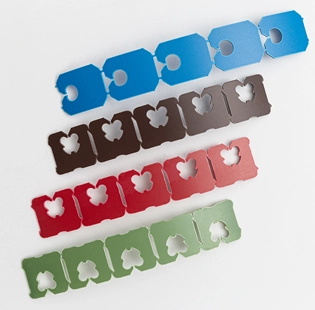Bread Clips

製品記述
Bread Clips
Bread clips bulk, also known as bread tags or bread bag clips, are small, flat plastic or sometimes cardboard devices used for sealing plastic bags in which sliced bread is commonly sold. These clips serve a simple yet essential function: they keep the bag closed and the bread inside fresh by preventing exposure to air and contaminants. Often color-coded, bread clips can also indicate the day of the week the bread was baked, aiding in inventory control and ensuring freshness in grocery stores. Reusable and easy to handle, bread clips are a ubiquitous tool in kitchens worldwide, reflecting an elegant solution to everyday food storage.
TYPES OF OUR BREAD CLIPS
Plastic Food Bag Closure Bread Clip
Biodegradable Kraft Paper Bread Clip
ARE BREAD CLIPS SAFE?
Bread clips are generally safe for their intended use, which is to seal bread bags and similar types of packaging. However, there are a few safety considerations to keep in mind:
1. Choking Hazard: The bread sealing clip is small and can be easily swallowed, making it a potential choking hazard, especially for young children and pets. It's important to keep it out of reach of small children and to dispose of it securely to ensure it is not accidentally ingested.
2. Handling Care: While not sharp, the edges of plastic bread clips can sometimes break or crack, potentially creating jagged edges that could scratch or cut skin if not handled carefully.
3. Material Safety: Bread clips are typically made from plastics like polyethylene, which are considered safe for contact with food. However, these types of packaging twist ties are not meant to be heated or used in microwaves, as melting plastic can release harmful chemicals.
In summary, bread clips are safe when used correctly and responsibly. Ensuring that they are kept away from young children and pets, and using them only for their intended purpose, will help avoid any potential issues.
FAQ
FAQS OF BREAD CLIPS
-
Can plastic bread clips be recycled?
Plastic bread clips can technically be recycled as they are usually made from types of plastic such as polystyrene or polyethylene. Twist HD is also committed to developing paper bread clips, which are more environmentally friendly and biodegradable.
How do I recycle bread tags?
1. Check Local Guidelines: Contact your local recycling facility to see if they accept bread tags. Some facilities have specific instructions for small items.
2. Bulk Collection: Collect bread tags in a larger container, such as a plastic bottle of the same plastic type. Once the container is full, cap it and recycle the entire bottle, ensuring the small tags don’t fall through sorting machinery.
3. Special Programs: Look for special recycling programs in your area or online that specifically accept bread tags. Some charities collect these tags for fundraising through recycling programs.
4. Repurpose: Consider repurposing bread tags for crafts, organization, or other practical uses around the home to extend their life and delay their journey to the landfill.
What are some alternative uses for bread clips?
Beyond sealing bread bags, bread clips can be used for various purposes, including labeling cords, marking the end of a tape roll, or even as makeshift bookmarks.
How do I dispose of bread clips if they can’t be recycled?
If recycling isn’t an option, bread clips should be disposed of in the trash. To prevent them from contributing to plastic pollution, ensure they are securely placed inside a garbage bag.
Do bread clips have an expiration date?
Bread clips do not have an expiration date, but they can wear out or break with extensive reuse. Inspect them regularly and replace them if they lose their ability to clamp securely.
Twist-HD specializes in packaging and sealing products. Our various products can be widely used in bakeries, coffee shops, supermarkets, gardens, farms, laundry rooms and homes where packaging and strapping are required.

